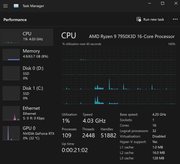Hi,
Can anyone tell me what exactly this driver does and how it differs from the PPM Provisioning File Driver?
Specifically, is it required on a single-CCX 7800X3D? I know the Provisioning Driver isn't as its jobs is to park the secondary CCX cores when a game is detected, which is obviously irrelevant on a single-CCX CPU but I can't find anything definitive on the Optimizer driver.
TIA
Can anyone tell me what exactly this driver does and how it differs from the PPM Provisioning File Driver?
Specifically, is it required on a single-CCX 7800X3D? I know the Provisioning Driver isn't as its jobs is to park the secondary CCX cores when a game is detected, which is obviously irrelevant on a single-CCX CPU but I can't find anything definitive on the Optimizer driver.
TIA



